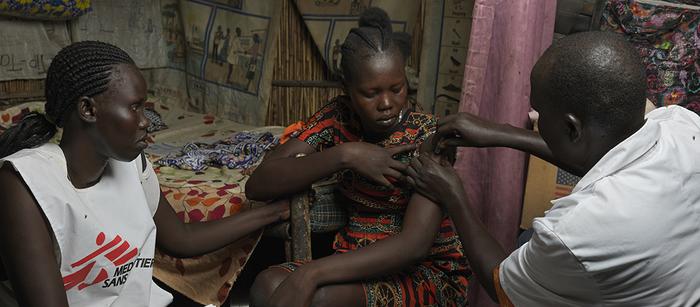
In an unprecedented public health initiative, the humanitarian organization Doctors Without Borders (Médecins Sans Frontières, MSF) has joined forces with the South Sudanese Ministry of Health to combat the hepatitis E outbreak affecting the Bentiu camp. Since March 2022, their collaborative vaccination campaign aims to avert the viral infection, which poses a significant threat to vulnerable populations, particularly pregnant women and those with underlying health issues. The ramifications of hepatitis E can be severe, with a staggering mortality rate that can rise as high as fifty percent in high-risk groups.
Hepatitis E is often mistaken for other illnesses due to its non-specific symptoms, including jaundice, fever, and fatigue. While precise global metrics remain elusive, studies suggest that the virus accounts for approximately fifty thousand deaths annually. Andrew Azman, an esteemed epidemiologist from the UNIGE-HUG Centre for Emerging Viral Diseases, sheds light on the critical situation in Bentiu, a camp harboring over one hundred thousand displaced individuals. Frequent outbreaks of hepatitis E and related waterborne diseases can be attributed to dire sanitation conditions exacerbated by recurrent flooding. The urgency for effective medical interventions in such contexts cannot be overstated.
The focal point of this vaccination project is Hecolin, a recombinant hepatitis E vaccine that has been used in clinical trials since its licensing in China in 2011. Until now, its application in outbreak scenarios had not been thoroughly explored outside clinical environments or specific travel medicine circumstances. This project’s significance lies in its endeavor to appraise the vaccine’s effectiveness across diverse populations and environmental conditions that differ from those in China. The findings of this research will substantially inform global health strategies regarding hepatitis E vaccination, leading to improved outbreak response frameworks.
Dr. Isabella Eckerle, Professor of Medicine and Director at the UNIGE-HUG Centre for Emerging Viral Diseases, underscores the importance of evaluating vaccine efficacy after only two doses—prior studies had typically adhered to a three-dose regimen administered six months apart. The study aimed to provide robust epidemiological data that could stand up to scrutiny and assist healthcare planners in making evidence-based decisions.
The campaign specifically targeted individuals over sixteen years of age and was conducted in three distinct rounds. The vaccination rounds were held during the months of March, April, and October 2022. After vaccination, MSF researchers identified two hundred and one hepatitis E-positive patients between May and December of the same year. Their task was to compare the vaccination status of these patients against that of asymptomatic individuals living within the same geographical area.
Despite witnessing fewer hepatitis E cases than anticipated following the vaccination campaign, the study conveyed promising findings, revealing the vaccine’s effectiveness after just two doses. This outcome is particularly noteworthy when considering the complex living arrangements and health challenges endemic to refugee camps, where access to healthcare is limited, and disease transmission can thrive in overcrowded conditions.
The biological characteristics of the virus, along with immune response data, were meticulously examined in the laboratories of the Centre for Emerging Viral Diseases. The intricate relationship between laboratory findings and field data not only attested to the protective effects of the vaccine but also deepened the understanding of transmission dynamics and diagnostic efficacy. Such insights could inform better strategies for epidemic management, including the refinement of diagnostic tests that are critical during outbreaks.
The research partnership not only highlights the synergy between MSF’s operational expertise and the scientific capabilities of the UNIGE-HUG Center but also illustrates a model for future collaborative efforts in tackling emerging viral diseases. The findings from this study have significant implications for public health policy and the operational readiness of health institutions worldwide.
Moreover, the results of this vital research were instrumental in propelling the World Health Organization’s International Coordinating Group (ICG) on Vaccine Provision to establish a contingency stockpile of hepatitis E vaccines for emergency response scenarios. This proactive measure aims to save countless lives during future outbreaks, as the reality on the ground demonstrates a persistent vulnerability of displaced populations to viral infection.
In conclusion, the research confirming the efficacy of two doses of the hepatitis E vaccine during an outbreak, especially in impoverished and overcrowded environments, provides a hopeful outlook for public health interventions in similar crisis settings worldwide. It reflects the ongoing commitment of global health organizations to implement scientific findings in ways that are impactful and enduring. The anticipated deployment of the WHO’s vaccine stockpile illustrates a critical step in the fight against hepatitis E, aiming to reduce the catastrophic burden that this virus imposes on at-risk communities.
Subject of Research: Humanitarian health intervention in hepatitis E vaccination
Article Title: The effectiveness of two doses of recombinant hepatitis E vaccine in response to an outbreak in Bentiu, South Sudan: a case–control and bias indicator study
News Publication Date: 8-Jan-2025
Web References: The Lancet Infectious Diseases DOI: 10.1016/S1473-3099(24)00657-1
References: Data from ongoing studies and publications related to hepatitis E and vaccination efforts
Image Credits: © Peter Caton
Keywords: Hepatitis E, vaccine efficacy, MSF, South Sudan, public health, outbreak response, Hecolin vaccine, epidemiology, global health, humanitarian intervention, UNIGE-HUG Centre, waterborne diseases.





